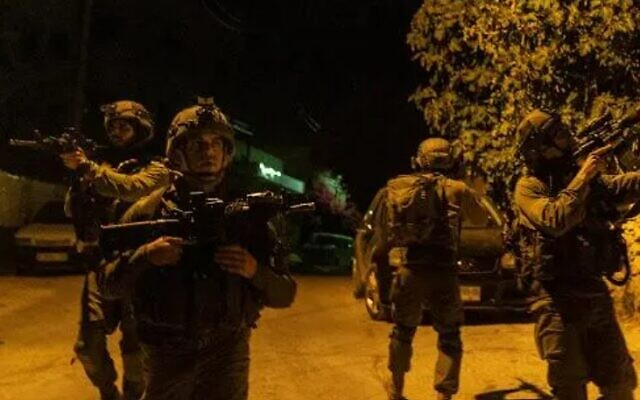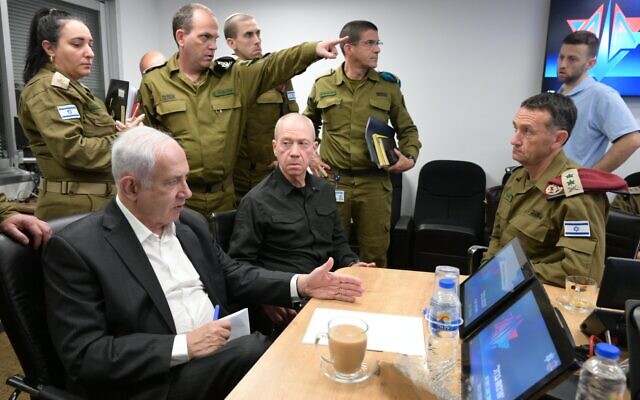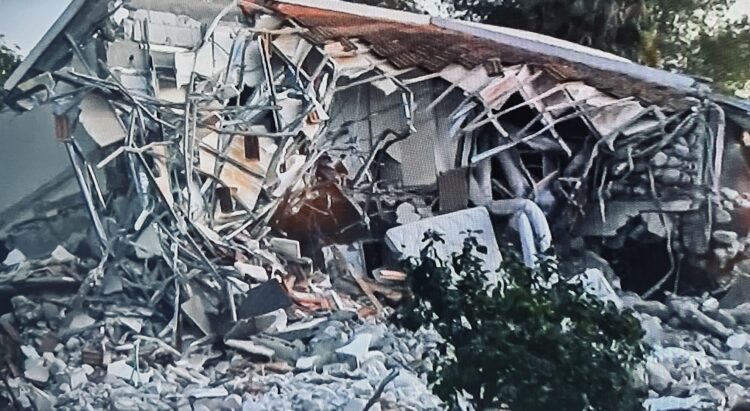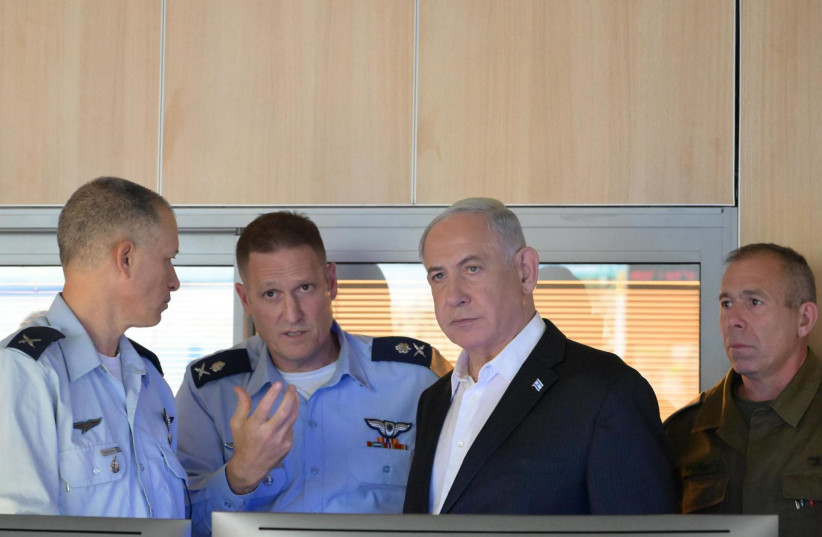The catastrophic Israeli intelligence and military failure that enabled some 3,000 Hamas terrorists from the Gaza Strip to breach Israel’s security fence and kill 1,400 civilians, soldiers and policemen and abduct 199 hostages within a matter of hours will haunt Israel for decades to come.
The October 7 attack was like a bolt out of the blue, with Israel having been taken by complete surprise. The terrorists who stormed into southern Israel in a murderous rampage that targeted men, women, children, babies and the elderly encountered precious little resistance.

And two days elapsed before approximately 1,500 terrorists were killed by Israeli forces and the area they had occupied and plundered was cleared.
“This is a major failure,” said Yaakov Amidror, a former national security advisor to Prime Minister Benjamin Netanyahu.

The events of October 7 represent a much greater security lapse than Israel’s unpreparedness on the eve of the 1973 Yom Kippur War, when Egypt and Syria launched a coordinated offensive in the Sinai Peninsula and the Golan Heights. Israel learned of these impending attacks around 24 to 48 hours before they actually occurred and took precautions to reinforce its garrison on the Golan.
Hamas, the governing authority in Gaza since 2006, conducted a clever two-year campaign of deception to trick Israel into believing that it was more interested in rebuilding Gaza’s shattered economy than in continuing its war of jihad against Israel.
Hamas sat out the 2021 cross-border Gaza war and did not participate in the last major clash between Israel and Islamic Jihad this past May, leading the Israeli government to assume that Hamas was unwilling to confront Israel militarily. And until very recently, the Gaza border region was relatively quiet, with very few incidents having taken place. It seemed as if Hamas was deterred and in pragmatic mode.
Netanyahu played into Hamas’ hands. He thought that Hamas could be contained or fobbed off if it was offered sufficient inducements in the guise of hefty subsidies from Qatar, thousands of work permit for Gaza laborers, and Israel’s tacit acceptance of its dictatorial rule.
In line with this short-sighted policy, Netanyahu sidelined Hamas’ rival, the Palestinian Authority, which, unlike Hamas, rejects violence as a means of achieving Palestinian statehood. All the while, Netanyahu and his extreme right-wing government disingenuously claimed that Israel had no peace partner in the PA, continued to expand settlements in the West Bank to extinguish all possibilities of a two-state solution, and focused his attention on battling Palestinian terrorists in West Bank towns such as Jenin and Nablus and on Hezbollah’s provocations on the northern Lebanese front.
Netanyahu, too, was distracted by the nation-wide uproar caused by his generally unpopular scheme to overhaul the judiciary. This, in turn, infuriated thousands of reservists in the armed forces, who threatened to end their voluntary service. These incidents of civil disobedience led Israel’s enemies to conclude that Israel was fragmented, divided and weak and ripe for the picking.
Due to these circumstances, Hamas possibly accelerated its war plans. But according to the latest information, Hamas began preparing the ground for it in 2021 or even earlier. Hamas built a mock Israeli village near the border to train fighters for its wide-ranging assault, and its military wing kept its plan under wraps.
Moussa Abu-Marzouk, a Hamas leader based in Qatar, disclosed on October 14 that its political echelon had no prior knowledge of the timing or the scope of the October 7 attack and were surprised by it. And he admitted that Hamas did not expect such an anemic Israeli military response.
Despite the secrecy engulfing Hamas’ war plan, the U.S. Central Intelligence Agency and Egypt — the first Arab state to sign a peace treaty with Israel and the mediator of choice between Israel and Hamas following border clashes — got wind of it.
In the days prior to the attack, the CIA issued two reports regarding the possibility of an escalation of violence along Israel’s Gaza border. The reports noted that Israel’s adversaries might try to exploit the growing divisions within Israeli society for their advantage and warned of the prospect of Hamas rocket fire, but they did not speak of a full-blown ground invasion.
According to an Associated Press account, Egyptian Intelligence Minister Abbas Kamel phoned Netanyahu ten days before the attack to warn him that “something unusual, a terrible operation,” was imminent.
Netanyahu, being “submerged” in problems relating to his judicial reform proposals and the upsurge of Palestinian violence in the West Bank, either appeared indifferent to the news or minimized the looming threat from Gaza.
Netanyahu, who bears ultimate responsibility for this colossal fiasco and who will probably have to resign when the dust finally settles, has denied receiving any such Egyptian warning and has dismissed it as “fake news.”

Now it emerges that Israel received scraps of information that something was brewing in Gaza. Early in the morning prior to the attack, Netanyahu conferred with high-ranking army officers and Shin Bet officials to assess the situation. They concluded that Hamas was most probably conducting a drill and agreed to hold further discussions.
Daniel Hagari, a spokesman for the Israel Defence Forces, said there had been “signs” of trouble on the horizon, but no major intelligence warnings.
In any event, Israel’s leadership was reasonably confident that Israel’s billion dollar high-tech system of fencing, watch towers, sensors, cameras and patrols would detect an attack and provide security for the residents of southwestern Israel.
But as they left the meeting, hoping for the best, a substantial Hamas force on pickup trucks, motorcycles and paragliders launched an unprecedented assault on towns like Sderot and Ofakim, kibbutzim such as Be’eri and Nir Oz, eight military bases, and a music festival.

During the initial phase of the onslaught, which was accompanied by a barrage of about 2,000 rockets and mortars, Hamas drones disabled Israeli cellular and communication stations and surveillance towers and remote-controlled machine guns along the border.
Israel was thereby blinded, rendered incapable of monitoring the area of about 45 square kilometers under sustained attack, and responding to it.
Another problem was that Israel had reduced its military presence near Gaza, having transferred troops to the West Bank to cope with the threat of a third Palestinian uprising.
In the meantime, Hamas bulldozers methodically destroyed sections of the fence, permitting thousands of terrorists to pour through some 30 points, leaving Israelis unprotected. Having stormed into Israel virtually unopposed, Hamas terrorists shot and killed Israeli soldiers in their barracks, troops and police attempting to fend them off, and civilians.

The terrorists committed war crimes against civilians, murdering individuals and families, killing babies and their mothers, raping and assaulting women, and burning down buildings. These inimaginable atrocities have enraged Israel and Israelis to the boiling point and have triggered the fifth and bloodiest Gaza war in 15 years, which may well spark a regional conflict if Hezbollah and Iran decide to intervene.
Netanyahu has not publicly acknowledged his monumental and unforgivable failure, but Bezalel Smotrich, the finance minister, has conceded that the Israeli government had utterly failed to keep the country safe.
“We must say, with honesty and pain and with our heads bowed: We have failed,” he said of the worst massacre to befall Israel since statehood 75 years ago and the worst attacks against Jews since the Holocaust. “We did not manage to fulfill the most important, unwritten contract between a state and its citizens.”

Israel’s chief of staff, General Herzi Halevi, has acknowledged yawning failures as well. “The Israel Defence Force is responsible for the security of the country and its citizens, and on (October 7), we did not handle it,” he said in a candid admission. “We will do everything to restore this contract, to bring back security.”
This may be true, but in the meantime, Israel has paid a terrible price for its unpreparedness.
